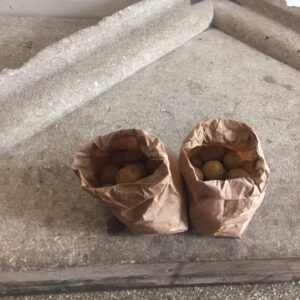Did you know that sharing existed before the internet? Sharing is as old as society! The instinct to share things led the hunter-gatherers to band together and settle on the land.
If sharing ignites the spirit of communal living, in urban communities it takes on a special character. Since at least the middle of the twentieth century, residents of apartment buildings have exchanged books and magazines with each other anonymously, removing any labels or stamps that might identify the original owner before setting them out on the book share shelf, to be enjoyed again.
In my own building, the trash room is a sharing place. I’ve found a lot of books there over the years and, some time around 2004, a sturdy wooden bookcase. Sometimes, even if I don’t take an item, I’ll photograph it for my archive of discarded objects. This collection of refuse imagery has served as a primary research corpus. It’s no exaggeration to say that my academic career has been built upon photographs of discarded or unwanted things.
Others also feel a documentary impulse when faced with the discards of their neighbours. Sometimes, a friend will share with me a photograph of something someone has left out. Here’s one from an apartment building with a very active sharing spot.

The person who left these potatoes probably wasn’t thinking about the history of sharing. Still, as it happens, it’s a history in which potatoes play a big role. In Scotland and Ireland, potatoes became staple crops after the mass displacement of tenant farmers by landowners in the eighteenth and nineteenth century. There was plenty of land, but the lords and ladies didn’t want to share. With the farmers out of the way, the rich, wild highlands could be used as game preserves.
The people who were cleared off the land had to make their living on its margins. They were known as crofters. You could also call them sharecroppers. Potatoes were the only things that grew in the stony soil. So potatoes became their primary food. You can still see the remains of potato beds, fertilized with heaped seaweed, in parts of Scotland and Ireland today.
When the potato crop failed, Irish and Scottish people starved. This, at least, is well known. But it was not a famine. Landlords grew grain in Ireland for handsome profits throughout the famine years. The supply chain remained secure. Wagons carried wheat from Anglo-Irish estates to British ships waiting at the docks, passing hundreds of dying people on their way. Some crops are too valuable to share.
This shameful history seems far removed from the inviting clutch of potatoes pictured here in their brown paper bag. They came out of the ground and went straight into a cardboard box with other items of organic produce, as part of a Community Supported Agriculture package. Such schemes, also known as farm shares, are not cheap. These spuds are special. They have made the transition from subsistence crop to artisanal produce. You don’t boil these potatoes, you curate them.
Back to the Editor's Blog
